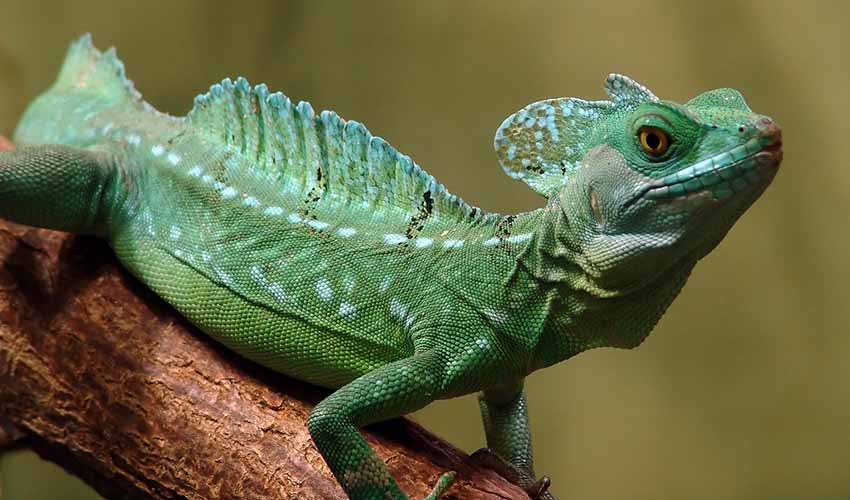One of the most extraordinary reptiles in Central America — famous for its dazzling appearance and almost supernatural ability to run across water. Native to the tropical rainforests of Honduras, Costa Rica, Nicaragua, and Panama, this agile lizard lives near rivers and streams, where it can make a quick escape from danger by dashing upright across the surface of the water. With its long toes fringed by specialized scales, it slaps and spreads its feet just fast enough to avoid sinking — a skill that earned it its miraculous nickname.
Physically, the plumed basilisk is nothing short of spectacular. Males are especially striking, with bright green scales, a long tail, and three dramatic crests — one on the head, one along the back, and another on the tail — that look like leafy plumes. These “plumes” help with balance when running and may also be used to impress females or intimidate rivals. Females and juveniles are smaller and less ornate but share the same vibrant coloration and slender, athletic build.
Beyond their looks, plumed basilisks are clever, alert, and highly adaptable. They spend much of their time perched on low branches or basking in filtered sunlight near rivers, ready to dive or sprint at the first sign of danger. They’re excellent climbers and swimmers, capable of staying underwater for up to 30 minutes when hiding from predators. Their diet is omnivorous — they eat insects, fruit, flowers, small fish, and even smaller reptiles, showing remarkable flexibility depending on what’s available. Their keen eyesight helps them spot movement instantly, and their quick reflexes make it nearly impossible for them to catch in the wild.
Distribution
 Costa Rica
Costa Rica Honduras
Honduras Nicaragua
Nicaragua Panama
PanamaAnything we've missed?
Help us improve this page by suggesting edits. Glory never dies!
Suggest an editGet to know me
Terrestrial / Aquatic
Altricial / Precocial
Polygamous / Monogamous
Dimorphic (size) / Monomorphic
Active: Diurnal / Nocturnal
Social behavior: Solitary / Pack / Herd
Diet: Carnivore / Herbivore / Omnivore / Piscivorous / Insectivore
Migratory: Yes / No
Domesticated: Yes / No
Dangerous: Yes / No




